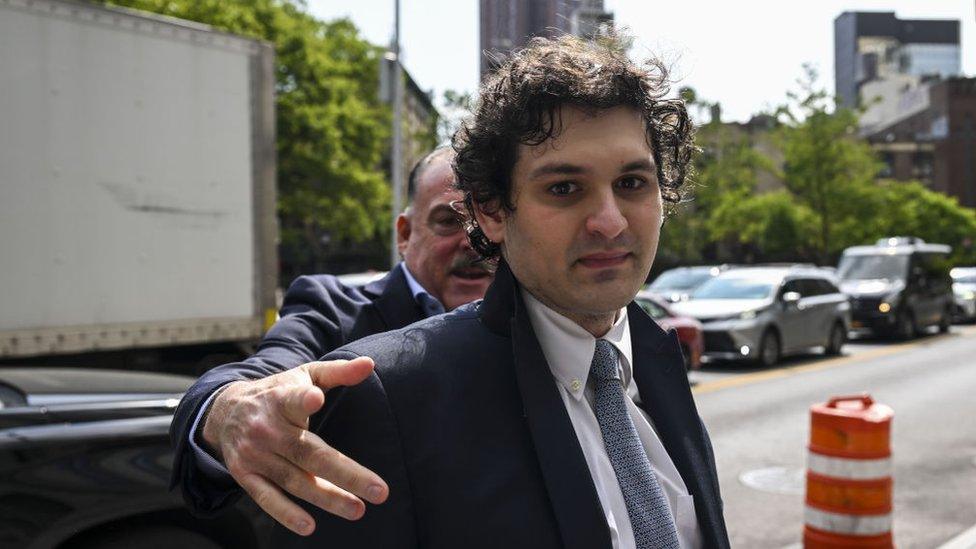Fallen 'Crypto King' Sam Bankman-Fried gets 25 years for fraud
- Published
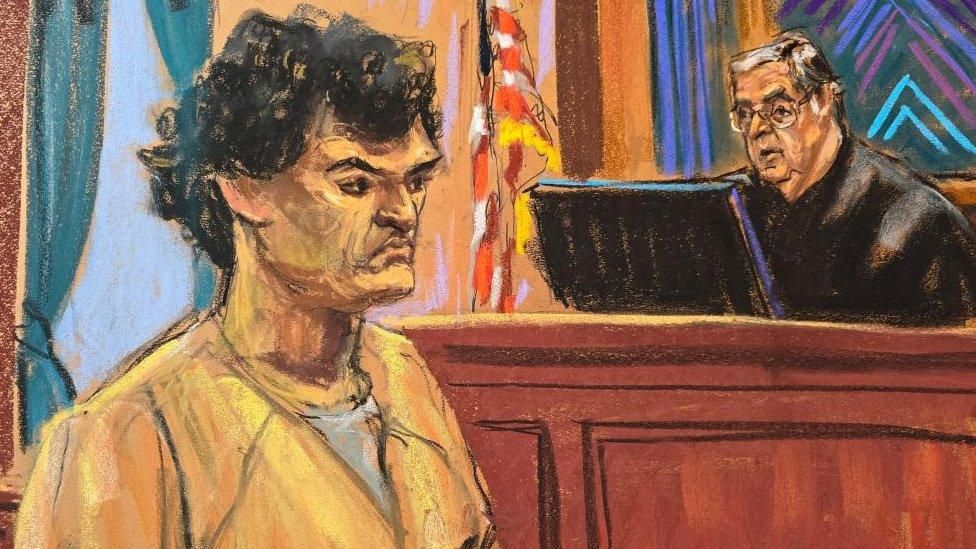
Sam Bankman-Fried, co-founder of the failed crypto exchange FTX, has been sentenced to 25 years in prison for defrauding customers and investors of his now-bankrupt firm.
The ruling cements the downfall of the former billionaire, who emerged as a high profile champion of crypto before his firm's dramatic collapse in 2022.
He was found to have stolen billions from customers ahead of the failure.
Bankman-Fried's legal team will appeal against his conviction.
A message from his parents shared with the BBC by a representative for Bankman-Fried said: "We are heartbroken and will continue to fight for our son."
Earlier, the 32-year-old said in court he knew "a lot of people" felt "really let down".
"I'm sorry about that. I'm sorry about what happened at every stage," he said, speaking quietly and clearly ahead of his sentencing.
FTX was one of the world's largest crypto exchanges before its demise, turning Bankman-Fried into a business celebrity and attracting millions of customers who used the platform to buy and trade cryptocurrency.
Rumours of financial trouble sparked a run on deposits in 2022, precipitating the firm's implosion and exposing Bankman-Fried's crimes.
He was convicted by a New York jury last year on charges including wire fraud and conspiracy to commit money laundering, after a trial that detailed how he had taken more than $8bn (£6.3bn) from customers, and used the money to buy property, make political donations and put toward other investments.
Before reading the sentence on Thursday, Judge Lewis Kaplan provided a harsh assessment of Bankman-Fried's behaviour, saying he had lied during his testimony at trial when he claimed he was unaware until the last minute that his companies were taking money entrusted to them for safe-keeping by customers and using it for other purposes.
"He knew it was wrong. He knew it was criminal. He regrets that he made a very bad bet about the likelihood of getting caught but he's not going to admit a thing," the judge said.
Though Bankman-Fried had made "protestations of sorrow" about customer losses, he had uttered "never a word of remorse for the commission of terrible crimes", he added.
While 25 years constitutes a serious prison sentence, it is far less than the more than 100 years Bankman-Fried could have received under official government guidelines.
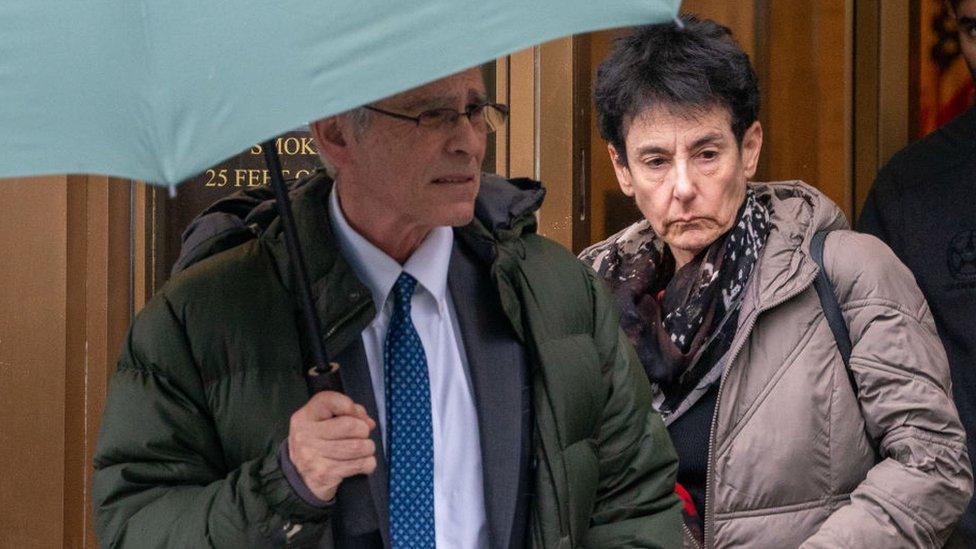
Barbara Fried and Allan Joseph Bankman, parents of FTX co-founder Sam Bankman-Fried, said they were "heartbroken" after the sentencing
Federal prosecutors in New York this month told the judge such a long term was not necessary.
But they requested at least 40 years, arguing that Bankman-Fried had committed a massive fraud, while showing "brazen disrespect" for the law.
Bankman-Fried's team had argued for a lighter sentence of roughly five to 6.5 years.
They said that he was a non-violent, first-time offender, and pointed to mental health struggles and argued that customers were poised to recover significant sums under a plan currently working through bankruptcy court.
"The victims want their money back and they should get it," his lawyer, Marc Mukasey, argued in court on Thursday morning. "Sentence him to work hard and give it all away."
Former federal prosecutor Mitchell Epner, now a lawyer at Rottenberg Lipman Rich, said he was "very surprised" by the ruling, noting that Bankman-Fried could potentially be released from prison in about 13 years.
But Jennifer Taub, a law professor at Western New England University and expert on white-collar crime, said she thought the length of the sentence was appropriate.
"It is the right balance between how old he is and what is the purpose of deterrence," she said.
In his sentencing remarks, Judge Kaplan said what could amount to a life sentence was unnecessary but that Bankman-Fried must receive a punishment sufficient to prevent him from committing future crimes.
"There is a risk that this man will be in a position to do something very bad in the future and it's not a trivial risk, not a trivial risk at all," he said.
He also ordered Bankman-Fried to forfeit $11bn that can be used to compensate victims.
The government has already seized some of those assets, such as shares Bankman-Fried owned in Robinhood, the trading app which raised more than $600m when they were sold last year.
Bankman-Fried showed little visible reaction to the ruling.
Bankman-Fried has admitted to mistakes of mismanagement, but maintained that he was acting in good faith.
In his comments ahead of the sentencing, he stuck to his story that FTX had the holdings to repay customers at the time of its collapse and said he did not think that reasons behind customer suffering had been "properly told".
"They've been failed by more people than I can count" including himself, he said, speaking of the exchange's customers. "It's been excruciating to watch."
Bankman-Fried said he was sorry for disappointing not only customers but also former employees, including top lieutenants Caroline Ellison and Gary Wang, formerly close friends who testified against him at trial and whom he praised in his remarks.
"They all built something really beautiful, they threw themselves into it and then I threw it all away," he added. "It haunts me every day."
Dozens of people, including former FTX customers, family, friends of his parents and complete strangers, had submitted letters to the court, trying to sway the outcome.
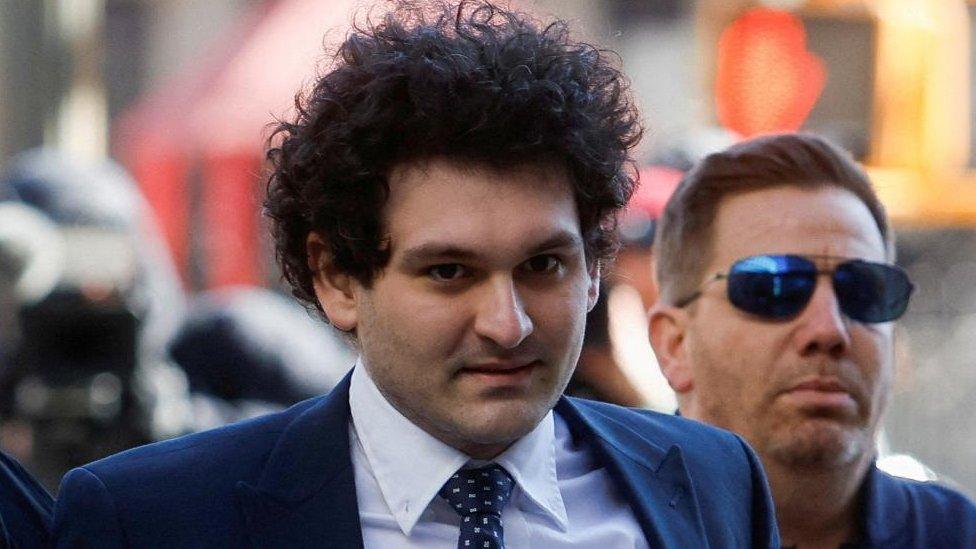
Louis Dorigny of California, who had been an FTX customer said it was a "bittersweet moment for creditors".
"I don't wish jail time on anybody, and 25 years is a very, very long time to be in prison, but it does nothing to compensate the victims for the loss of their cryptocurrency," he said.
Samuel Hapak, chief executive of crypto trading fund Wincent, whose firm represented 200 investors with millions of dollars at FTX when it entered bankruptcy, told the BBC that he thought the ruling was "fair".
"Twenty-five years is a lot and I believe that this sounds like a reasonable signal to the industry that it needs to step up the game," he said.
Judge Kaplan said he would not recommend Bankman-Fried serve his sentence in a maximum security prison because the court had no reason to believe he posed a threat of violence.
He said he was also taking into account concerns raised by his lawyers and parents that Bankman-Fried's social awkwardness stemming from autism spectrum disorder would make him vulnerable in prison.
Bankman-Fried's case has been closely watched by other crypto executives and firms facing charges.
But he is not the first player in the industry to be sentenced.
Karl Sebastian Greenwood, who worked with "Cryptoqueen" Ruja Ignatova, was sentenced to 20 years in prison last year for his role convincing millions of people to invest more than $4bn in a fraudulent currency, OneCoin.
His case also drew comparisons to Bernie Madoff, who was setenced to 150 years in prison after being found guilty of a $64bn Ponzi scheme.
Former federal prosecutor Marc Litt, who worked on the the case against Madoff and is now a lawyer at Wachtel Missry, said he saw big differences between the two fraudsters, noting Madoff was older when sentenced, had committed his crimes over several decades, stolen from people he knew well and had no one step forward to testify to his character.
"The court implicitly took those sorts of differences into consideration and I believe that the resulting lower sentence was both warranted and is unlikely to be disturbed on appeal," he said.
Related topics
- Published3 November 2023
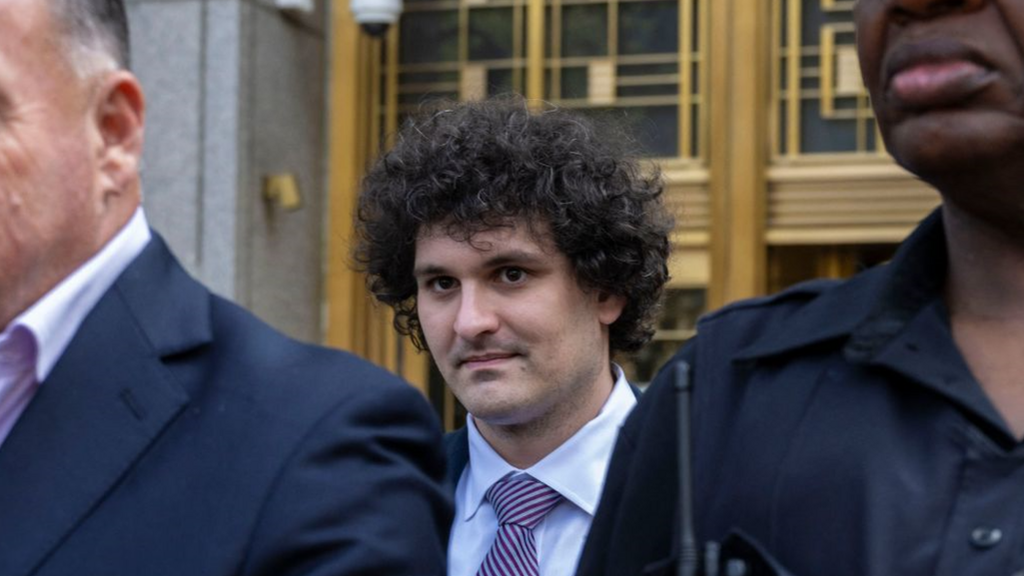
- Published28 March 2024
